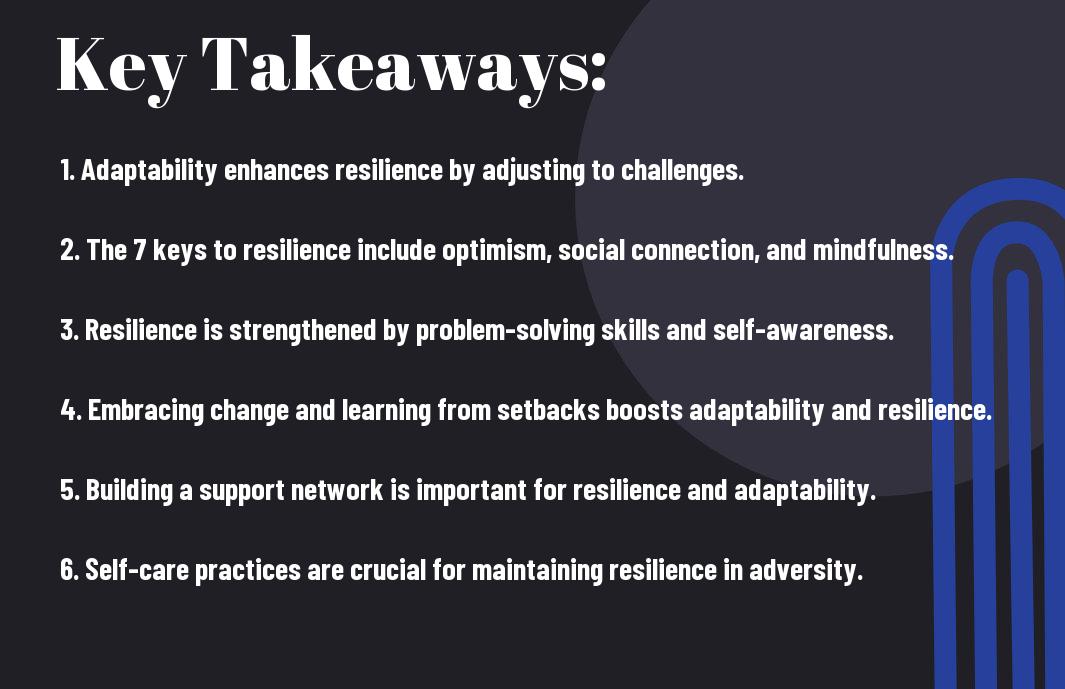How Does Adaptability Contribute To Your Resilience? What Are The 7 Keys To Resilience?
You may have heard that resilience is a crucial trait to cultivate in order to navigate life’s challenges, but do you know how adaptability plays a key role in building resilience? In this blog post, we will explore the concept of resilience and explore the 7 keys that can help you enhance your ability to bounce back from adversity. Understanding these keys can empower you to face obstacles with strength and perseverance, ultimately leading to greater well-being and success in the face of life’s inevitable curveballs.
Key Takeaways:
- Adaptability strengthens resilience: Being adaptable allows you to navigate challenges and setbacks with flexibility and openness to change.
- The 7 keys to resilience: Foster optimism, build a support system, cultivate self-awareness, develop problem-solving skills, exercise self-care, strive for balance, and embrace change.
- Optimism as a key component: Maintaining a positive outlook and belief in your ability to overcome adversity is crucial in resilience building.
- Self-awareness and self-care are necessary: Understanding your emotions and needs, as well as practicing self-care activities, can enhance your ability to bounce back from challenges.
- Embracing change is a sign of resilience: Being willing to adapt and grow through life’s transitions demonstrates a resilient mindset.


The Interplay between Adaptability and Resilience
Defining Adaptability in the Context of Resilience
With the ever-changing nature of life, adaptability plays a crucial role in enhancing resilience. Adaptability can be defined as the ability to adjust to new conditions and change course when faced with challenges or unexpected circumstances. In the context of resilience, adaptability involves being flexible, open-minded, and proactive in responding to stressful situations.
The Role of Adaptability in Overcoming Adversity
Adaptability is a key factor in overcoming adversity and building resilience. When individuals are adaptable, they can more easily navigate obstacles, pivot when necessary, and find creative solutions to problems. By embracing change and being willing to step out of their comfort zones, individuals can develop the resilience needed to endure and thrive in the face of adversity.
The 7 Keys to Resilience
Emotional Awareness and Regulation
Regulation of emotions is a crucial element in building resilience. Recognizing and understanding your emotions can help you manage them effectively, leading to better-coping strategies during times of stress and adversity.
Positive Outlook and Optimism
With a positive outlook and optimism, individuals are more likely to see setbacks as temporary and manageable challenges. This mindset can enhance resilience by fostering a belief in one’s ability to overcome obstacles and find solutions even in difficult situations.
Building Strong Relationships and Networking
Networking and cultivating strong relationships provide a support system that can offer encouragement, advice, and a sense of community during tough times. These connections can significantly enhance resilience by providing a sense of belonging and emotional support.
Developing Problem-Solving Skills
To build resilience, it is important to hone problem-solving skills that enable individuals to approach challenges with a proactive mindset. Developing the ability to assess situations, identify solutions, and take decisive action can bolster resilience in the face of adversity.
Establishing Realistic Goals and Taking Decisive Action
For resilience to thrive, setting realistic goals and taking decisive action towards them is key. By establishing achievable objectives, individuals can maintain focus, stay motivated, and make progress even in challenging circumstances.
Maintaining Physical Wellness
Regulation of physical wellness through practices such as exercise, balanced nutrition, and sufficient rest is vital for resilience. Physical well-being plays a significant role in strengthening one’s ability to cope with stress and bounce back from adversity.
Fostering a Growth Mindset and Continuous Learning
Action fostering a growth mindset and committing to continuous learning are important components of resilience. Embracing challenges as opportunities for growth and expanding knowledge can enhance adaptability and resilience in the face of change and adversity.
Strengthening Adaptability to Enhance Resilience
Practical Strategies for Improving Adaptability
Many factors contribute to an individual’s ability to adapt and bounce back from challenges. Improving adaptability is crucial for enhancing resilience. One practical strategy is to embrace change and seek out new experiences regularly. By stepping out of your comfort zone, you can build the confidence and skills needed to navigate uncertain situations with ease.
Overcoming Barriers to Adaptive Behavior
Many people face barriers when it comes to exhibiting adaptive behavior. Overcoming these barriers is imperative for strengthening adaptability. It’s important to address fear of failure and perfectionism, as these traits can hinder your ability to adapt effectively. By practicing self-compassion and reframing setbacks as opportunities for growth, you can overcome these barriers and become more resilient in the face of adversity.
Enhance Adaptability through Mindfulness Practices
Enhance your adaptability by incorporating mindfulness practices into your daily routine. Mindfulness can help you develop a greater sense of self-awareness, which is imperative for adapting to change. By staying present in the moment and accepting things as they are, you can cultivate a flexible mindset that allows you to navigate challenges with resilience and grace.
The Impact of Resilience on Personal and Professional Life
Case Examples of Adaptability Leading to Success
Case studies have shown that individuals who possess a high level of adaptability are more likely to navigate challenges and setbacks successfully in both personal and professional realms. For instance, individuals who can quickly adjust to changes in their work environment are often able to seize new opportunities and excel in their careers.
Long-term Benefits of Being Resilient
An imperative aspect of resilience is the ability to bounce back from adversity and grow stronger as a result. Research has indicated that individuals who exhibit resilience tend to have better mental health outcomes, improved job satisfaction, and stronger relationships with others.
Another advantage of being resilient is the capacity to maintain a positive outlook even in the face of difficulties. This optimistic mindset can help individuals persevere through challenges and ultimately achieve their long-term goals.
Final Words
As a reminder, adaptability plays a crucial role in enhancing resilience by allowing individuals to adjust to new situations and bounce back from adversity. The 7 keys to resilience are self-awareness, self-care, social support, problem-solving, flexibility, optimism, and purpose. By developing these key traits, individuals can better navigate challenges and setbacks, emerging stronger and more capable of overcoming obstacles. Embracing adaptability and practicing resilience can lead to personal growth, increased mental toughness, and a more positive outlook on life. Remember to prioritize these qualities in your journey towards building resilience and conquering any obstacles that come your way.
FAQ
Q: Why is adaptability important for resilience?
A: Adaptability is crucial for resilience because it allows individuals to adjust to changes, challenges, and setbacks in a flexible manner. Being able to adapt to different circumstances and environments helps build the strength and capacity to bounce back from difficulties.
Q: How does adaptability contribute to building resilience?
A: By being adaptable, individuals can develop problem-solving skills, emotional intelligence, and a positive mindset. These qualities are important for fostering resilience and the ability to effectively cope with stress, adversity, and uncertainty.
Q: What are the 7 keys to resilience?
A: The 7 keys to resilience include self-awareness, mindfulness, emotional regulation, optimism, social connections, problem-solving skills, and adaptability. These key factors work together to help individuals navigate challenges and setbacks more effectively.
Q: How can self-awareness improve resilience?
A: Self-awareness allows individuals to recognize their emotions, thoughts, strengths, and weaknesses. By understanding oneself better, individuals can develop coping strategies, seek support when needed, and cultivate a resilient mindset to overcome difficulties.
Q: Why is social connection important for resilience?
A: Social connections provide emotional support, encouragement, and a sense of belonging, all of which are crucial for building resilience. Having a strong support network can help individuals cope with stress, boost their morale, and navigate challenges more successfully.